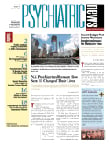Those who suffer from migraine headaches might agree that migraineurs are something of a society unto themselves: Sharing stories about symptoms, triggers, prevention tactics, recommended doctors, and effective treatments helps many patients cope with the condition and the distress and disruption it can cause.
Since such sharing is common, most migraineurs will not be surprised to learn that women experience migraines three times more commonly than men. Women are also three times more likely to have suffered from posttraumatic stress disorder (PTSD) at some point in their lives. The gender differences in etiologies for both conditions may be easy to explain: Migraines after puberty are often ruled by gonadal hormones in women, and women also suffer higher rates of interpersonal trauma (such as physical and sexual abuse) than do men.
But when researchers from the departments of neurology at Johns Hopkins University and the University of Toledo recently sought to examine the epidemiology suggesting an association between PTSD and migraine, with an emphasis on known sex differences, they found a surprising association: Male migraineurs are four times more likely than their female counterparts to have PTSD.
"It is unclear why the PTSD-migraine association is stronger in men than women," said B. Lee Peterlin, D.O., an assistant professor of neurology and director of headache research at the Johns Hopkins Headache Center in Baltimore, and her colleagues in a review article in the June Headache.
They postulated that the age of the occurrence of the traumatic life event (TLE) resulting in PTSD may be an important factor, citing previous studies showing that when a TLE occurs before age 13, the risk for major depression is greater than the risk for PTSD. When the TLE occurs after age 12, the risk of PTSD is greater. The peak age of vulnerability for childhood sexual abuse is younger than 13. In contrast, transportation accidents and combat (two of the most common TLEs reported by migraineurs with PTSD) may be more commonly experienced by those older than age 12.
"It is therefore plausible that in the migraine population, sex differences in the type and age of traumatization contribute to the sex differences in the risk of PTSD," said Peterlin and colleagues.
Peterlin told Psychiatric News how she became interested in the association between PTSD and migraine. "I noted that so many of my migraine patients (the majority of whom are women) reported a history of physical or sexual abuse—substantially traumatic life events. I hypothesized that such TLEs could modulate the pain pathways (suppress pain inhibitory pathways or accentuate excitatory pain pathways) such that the end result was an accentuation of pain expression. I wanted to use a validated instrument to evaluate the association between abuse and migraine."
When Peterlin looked for the best method to evaluate this association, however, she found that published PTSD instruments seemed to have the information she was looking for and were well accepted and validated tools. "Ultimately, the choice to evaluate PTSD to indirectly examine the impact of abuse on migraine was a serendipitous choice, as it appears that while the migraine-PTSD association is strong in migraineurs irrespective of sex, compared to those without migraine, it is stronger in male migraineurs than female migraineurs. This is the first comorbidity to be shown to be greater in male migraineurs than female migraineurs."
Peterlin was lead author of a recent study of PTSD, drug abuse, and migraine, the results of which were reported in Cephalalgia on January 31. "Interestingly, in that general population analysis of the migraine-PTSD association, my colleagues and I found that approximately 70 percent of migraineurs reported PTSD symptoms prior to developing migraine. Further, irrespective of PTSD status, the mean number of TLEs was greater in those with migraine compared to those with no headache: Migraineurs reported a mean of approximately five TLEs compared to three TLEs in those without headache." (Peterlin noted that this study was crosssectional, and that longitudinal studies are needed to confirm this finding.)
Peterlin's first study evaluating the migraine and PTSD association was funded in part by a grant from the American Headache Society. Her study evaluating the association in a general population cohort used the National Comorbidity Survey Replication (NCS-R) database, which is supported by the National Institute of Mental Health with supplemental support from the National Institute on Drug Abuse, Substance Abuse and Mental Health Services Administration, Robert Wood Johnson Foundation, and John W. Alden Trust.

